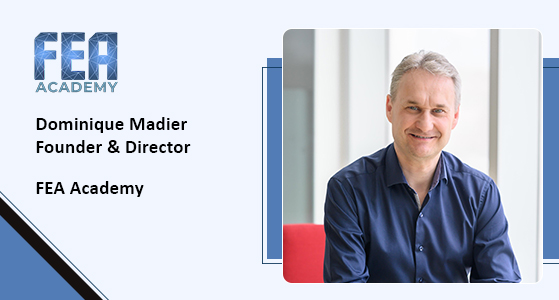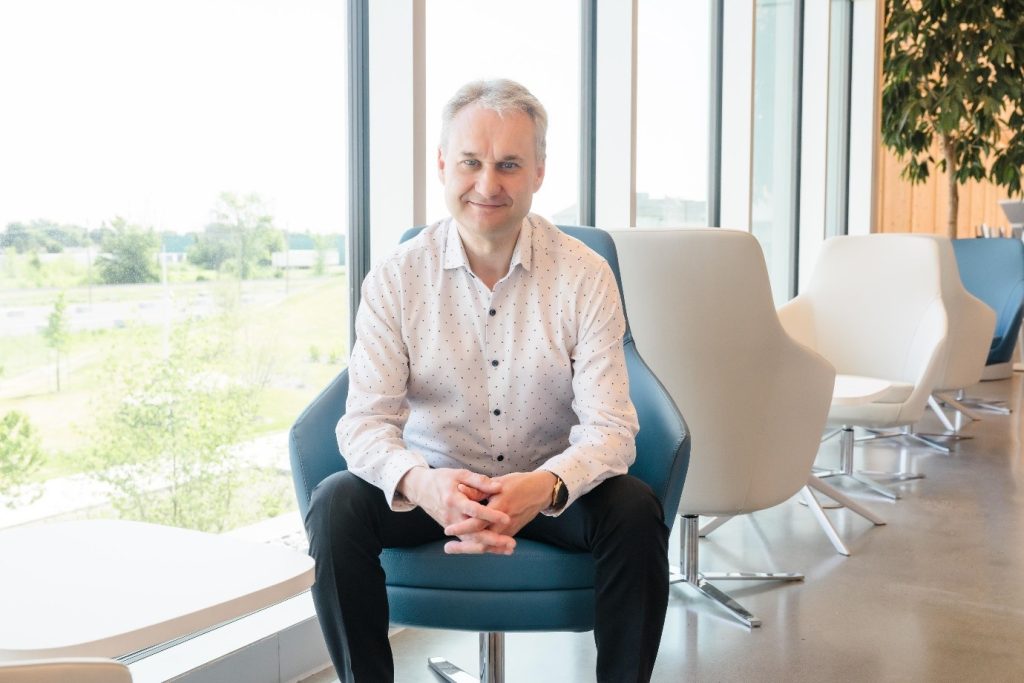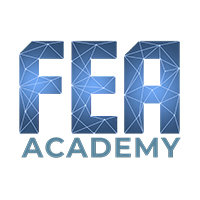
Empowering Engineers Through Expertise in Simulation
In this insightful conversation with Biz Tech Outlook, Dominique Madier, Founder of FEA Academy, discusses how the organization is empowering engineers worldwide through simulation-driven learning. Established in 2020, FEA Academy bridges the gap between software skills and real-world engineering mastery, shaping the next generation of simulation leaders through knowledge, mentorship, and innovation.
Please introduce FEA Academy, what does the acronym “FEA” stand for, and when was the organization founded?
FEA Academy, founded in 2020, stands for Finite Element Analysis, a powerful engineering methodology used to predict how structures and components behave under different physical conditions such as mechanical loads, vibrations, and thermal stresses. This technique is fundamental to modern engineering design, allowing professionals to create safer and more efficient products without excessive reliance on costly prototypes.
The idea for FEA Academy emerged from a clear need within the engineering community, bridging the gap between having access to advanced simulation tools and truly understanding how to use them effectively. Many engineers could operate FEA software, yet few mastered the underlying modeling principles that lead to accurate and reliable results.
FEA Academy was established to fill this gap by offering a comprehensive platform that combines consulting services, structured on-demand courses, and mentorship programs. The foundation of the academy traces back to the success of the book “Practical Finite Element Analysis for Mechanical Engineers”, which became a bestseller among professionals worldwide. Building upon that momentum, FEA Academy continues its mission to democratize simulation knowledge, helping engineers and organizations harness the power of FEA to innovate faster, reduce risk, and make smarter engineering decisions.

What are the main services, courses, or offerings that FEA Academy provides?
FEA Academy’s services are built around three core pillars designed to empower both engineers and organizations: consulting, training, and mentorship.
Through its consulting services, FEA Academy partners with companies—particularly in sectors like aerospace—to solve complex structural analysis challenges. The team provides complete simulation support, from model building and validation to interpreting results and delivering actionable design recommendations. This enables clients to make confident engineering decisions without needing to invest in expensive software or large in-house simulation teams.
The on-demand training courses are another key offering, focusing on universal modelling principles rather than software-specific tutorials. Inspired by the bestselling book “Practical Finite Element Analysis for Mechanical Engineers”, these courses combine theory with real-world case studies and exercises to build lasting, transferable skills.
Lastly, the mentorship programs connect learners with experienced analysts who guide them through their professional or project challenges. Together, these three pillars form a complete ecosystem that helps companies achieve reliability while empowering engineers with the expertise to drive innovation.
Which technologies, platforms, or tools are critical to your operations?
At FEA Academy, technology forms the backbone of both our consulting and educational operations. On the consulting side, we work with advanced simulation platforms such as MSC Nastran, MSC Patran, and MSC Apex, which allow us to handle everything from linear static and nonlinear simulations to modal, buckling, contact, and frequency response analyses. These trusted solvers are widely used in industries like aerospace, automotive, and heavy engineering, ensuring accuracy and reliability in every project.
Beyond software, we place strong emphasis on universal modeling methodologies—principles like mesh quality, boundary conditions, load application, and result validation—that apply to any FEA platform. This software-independent approach ensures engineers develop deep, transferable skills rather than tool-specific habits.
For training and mentorship, we leverage modern e-learning systems, video conferencing tools, and interactive digital platforms to make high-quality instruction globally accessible. The seamless integration of advanced engineering software with scalable online technologies enables FEA Academy to deliver precise consulting results, practical education, and personalized mentorship worldwide.
Are there new markets or segments you plan to expand into?
FEA Academy is strategically expanding into new markets and industries where simulation-driven design is becoming a key enabler of innovation. While our foundation has been in the aerospace sector, we now see growing opportunities in renewable energy, electric mobility, medical devices, and industrial equipment. In these areas, advanced Finite Element Analysis helps reduce development risks, optimize performance, and accelerate time-to-market.
Geographically, we are extending our presence beyond North America and Europe into Latin America and the Asia-Pacific region. Countries like Brazil and India have a rapidly growing community of young engineers eager to gain practical FEA expertise that traditional education often doesn’t provide. Through our online training and mentorship programs, we are bridging that skills gap and bringing high-level simulation education to a global audience.
Ultimately, our mission goes beyond expansion—it’s about democratizing simulation knowledge. By making expert-driven FEA consulting and training accessible to startups, small and mid-sized companies, and individual engineers, FEA Academy empowers innovators worldwide to leverage simulation as a core competitive advantage.
What is your vision or roadmap for FEA Academy?
The vision for FEA Academy is to become a global leader in simulation consulting, training, and mentorship, setting a higher standard for how engineers apply Finite Element Analysis (FEA) in real-world projects. Since its inception, our mission has been to bridge the gap between owning advanced software and achieving true simulation mastery. Our roadmap builds on this foundation through three strategic directions.
First, we are expanding our consulting services to support industries embracing advanced technologies, from aerospace and energy to electric mobility and renewables, where FEA is essential for safer, more efficient designs.
Second, we are enhancing our learning ecosystem by introducing specialized workshops, masterclasses, and structured mentorship programs inspired by the success of “Practical Finite Element Analysis for Mechanical Engineers.” These will focus on hands-on, software-independent methodologies with deeper case studies and advanced applications.
Finally, our roadmap emphasizes global accessibility. By investing in digital platforms, we aim to make high-level simulation education available worldwide, empowering engineers in every region to innovate confidently and independently.
What emerging trends in education, technology, or industry do you see as opportunities for FEA Academy?
Emerging trends in education, technology, and industry are opening powerful opportunities for FEA Academy to expand its impact. In education, there is a clear movement toward flexible, on-demand, and application-driven learning. Engineers today want practical, project-relevant skills rather than purely theoretical instruction. This perfectly aligns with FEA Academy’s blended model of online learning, real-world case studies, and expert mentorship. The growing emphasis on lifelong learning also supports our mission, as professionals continually seek ways to strengthen their simulation capabilities and remain competitive.
Technologically, advancements in AI-assisted tools, cloud computing, and high-performance computing are reshaping simulation workflows. However, these tools still rely on sound engineering judgment and methodological expertise, areas where FEA Academy excels.
On the industry front, sectors like renewable energy, e-mobility, and medical devices are increasingly dependent on simulation to reduce risk and accelerate innovation. By combining consulting with advanced training, FEA Academy is uniquely positioned to empower engineers and organizations to harness the true potential of FEA in this evolving landscape.
Who are the key leaders behind FEA Academy? How has leadership shaped your direction?
FEA Academy’s leadership is shaped by a combination of strategic vision and collective expertise. Founded by myself, Dominique Madier, the Academy has grown under a leadership philosophy centered on practical, experience-driven knowledge. My own background in FEA, with over twenty-five years in structural simulation in the aerospace industry, gave the Academy its initial direction, closing the gap between software usage and real engineering expertise.

A defining milestone was the publication of my book, Practical Finite Element Analysis for Mechanical Engineers, in 2020. Its success confirmed the global need for accessible, practice-based knowledge and directly influenced the development of our courses and mentorship programs. Alongside me, a network of senior FEA experts and mentors contribute their industry experience, ensuring our services remain at the cutting edge of technology and aligned with real-world challenges. Together, this leadership team ensures FEA Academy remains focused on empowering engineers with reliable skills and companies with trusted simulation outcomes.
“Bridging the gap between software proficiency and real-world engineering mastery”
“Shaping the next generation of simulation leaders through knowledge, mentorship, and innovation”


Company Name : FEA Academy
Website : https://www.fea-academy.com/
Management Team
Dominique Madier | Founder & Director



